What We Did & Didn’t Like About Living in an RV Full Time
This post may contain affiliate links.
In 2016, my husband Josiah and I sold our house and bought a fifth wheel RV which we called home for over three and in three different states. Though we were mostly stationary while we lived in it, we planned to eventually go on the road full time, but recently we made the decision to stop full time RVing, sell our RV, and move into a 1500-square-foot rental home.
In this article, I thought I would share with you the reasons for our decision, some of the pros and cons of living in an RV, and some things to consider if you yourself are considering the full time RV lifestyle to make sure you enjoy the experience to the fullest and don’t end up with any regrets.

What we loved about living in an RV
Owning Less Stuff
One of the biggest immediate rewards of RV life was being freed from owning a bunch of stuff I was keeping only because I felt afraid of or guilty about letting go of it. It’s been wonderful to adopt a lifestyle where everything I own has as purpose, I know where to find whatever I’m looking for, and I generally feel less attached to my possessions.
When I was a kid my biggest fear was losing my home and belongings in a house fire, but after downsizing and facing my fear of letting go of sentimental items, I’ve reached a point where honestly feel that nothing I own would feel too devastating for me to lose.
Even now, living in a larger house again, I’m happy that I reduced the number of things I own because I can use the extra space to create an environment I enjoy spending time in instead of one that’s full of clutter and things I feel obligated to find a place for.
Flexibility to Relocate
Being able to easily move to a different state was a key factor in Josiah’s career development, especially when he started his software company. I won’t go into that story here, but if you’re interested you can listen to him talk about it on The RV Entrepreneur Podcast. Our ability to quickly and easily move also enabled us to easily return to our hometown of Springfield, Missouri to help out a family member when she had a baby.

Each move took us just three days: one day to remove our skirting, pack up some of the loose items in the RV, and secure the furniture, one day in transit (we paid someone from uShip.com to haul our RV for us) and one day to unpack and put things back in place. Then we were in our new home!
No Yard Work
When we had a house, I had a garden and lots of flower beds, and while I very much enjoyed these, they were also a lot of work. Staying in RV parks and mobile home parks that take care of lawn maintenance has spoiled us!
Of course, not all full-time RVers escape yard work; some end up buying a plot of land to park or even homestead on.
The RV Community

For me making friends with other full-time RVers was an unexpected benefit to RV life.
When we first had the idea of living in an RV, I had only ever known one other family to have done it, and it seemed like a wild and adventurous idea. Come to find out, thousands of people of all ages across the U.S. and even around the world are choosing to live in RVs and are connecting with one another in online communities.
Blogging about RVing has given me a way to connect with other RV bloggers, many of which have become real friends which I’ve been able to meet in person at RV shows and meetups like The RV Entrepreneur Summit. (I’ve known other RVers who enjoy meeting people at the Escapees RV Club meetups.)
Increased Earning Potential
This was definitely the biggest benefit for us. When we were living in Springfield before, our cost of living was shockingly low, yet so were our salaries, and our job opportunities were limited.
Daily life consisted of me coming home from work so tired I had trouble having time or energy to pursue my interests, exercise, or cook a healthy meal. Josiah often worked late into the night building websites, scrambling to get them done so he could get paid, and hoping to find a new client before the money from the last one ran out. Though we enjoyed many aspects of our life, it wasn’t what we wanted to do forever.
Leaving Springfield exposed us to ideas and experiences that created new opportunities for us. Moving to a major city allowed Josiah to get a higher-paying job that allowed him to develop skills that eventually enabled him to start his own company.
Since building remote businesses that have brought us increased time and financial freedom, we’ve realized we actually like living in Springfield–partly because we have more time (and money!) to enjoy it, and partly because we no longer feel stuck here.
What we hated about living in an RV
Hate is probably too strong of a word, but these were definitely some parts of RV life we didn’t love which eventually contributed to our decision to stop full-time RVing.

Constant RV maintenance
We knew RV life would come with RV maintenance, but that became very real to us the first day we moved into our RV. After closing on our house, we drove our U-Haul 3 1/2 hours north to Kansas City where we’d had our RV delivered a week earlier…and discovered that due to a heat wave that week, our main air conditioning unit had stopped working, and our RV was 99 degrees inside!
That was just the first of several maintenance headaches we experienced over the years. Fortunately, we had a good RV warranty that covered the cost of most of these repairs, but they were still a huge inconvenience when they did happen.
The last big issue we had was this past winter when our furnace wouldn’t ignite, resulting in a few sleepless nights staying in a hotel with our cat…right in the middle of a busy work week.
Lack of RV parks near major cities
Many people who live in a camper or motorhome choose to do so because they want to spend a lot of time out in nature at national parks, beaches, and remote areas. We, however, like being close to restaurants, coffee shops, gyms, yoga studios, grocery stores with plenty of selection, and other amenities that come with living in a mid- to medium-sized city.
The problem is, most major cities don’t have RV parks right in town, and those that do, especially those in more desirable climates, typically have long wait lists for people wanting a long-term spot.
In Kansas City, we found a mobile home park to live in just 15 minutes from downtown, but it wasn’t in the best part of town. In Dallas, the closest place we could find was 45 minutes north of the city. The most convenient location we lived in was the last place we stayed–a mobile home and RV park in Springfield, Missouri–but Springfield isn’t exactly a popular RV destination!
Cold weather

RVers who travel have the luxury of being able to live in their ideal climate year round. But since we were tied to a job in a physical location, that meant spending two winters in Kansas City, where winter temperatures regularly drop below freezing and occasionally below zero.
Even with a four-season RV we had to do extra work each fall to prepare for living in our RV in sustained cold, which was an inconvenience in addition to the fact that I just plain old hate being cold!
When we lived in Texas I was hopeful that I would finally get to escape the cold for winter–we had talked about moving farther south for a few months–but my sister-in-law was having a baby in early February, and I wanted to be in town to help out, so we ended up back in Springfield just in time for year three of cold weather RVing.
Less space for activities
We actually never felt too cramped in our RV (admittedly, our fifth wheel was bigger than the campers and motorhomes many full time RVers call home!). Some people complain about being in such close proximity to family members with no space to call their own, but that wasn’t something we minded.
When we lived in Kansas City, we were just 15 minutes away from just about anything we wanted to do. I attended yoga classes 3-4 days per week at a yoga studio just 10 minutes away, Josiah worked out at a Planet Fitness on his way home from work, and each weekend we would visit downtown restaurants and coffee shops.

Living north of Dallas, though, we were 30-40 minutes away from the nearest yoga studio, and even a fitness gym was at least 20 minutes away. We weren’t near any locations to get out and enjoy nature, either. The only thing we were able to do regularly for exercise was to take walks around our RV park. We missed activities we had enjoyed at other stages in our life, including rock climbing, road biking, and martial arts. I occasionally did yoga outside…until our yard became infested with fire ants!
After we moved back to Springfield, we both became very involved in a local jiu jitsu class, and that made us both wish we had room for mats at home so we could drill what we were learning in class. Also, Josiah is a pianist/singer/songwriter, and while he did have an electric keyboard in the RV, he started really wishing for an acoustic piano and recording equipment. It became clear to us that our ideal lifestyle was not centered around travel, but around our hobbies, and living in an RV no longer made sense for us.
Read Next: 8 Music and Recording Studios in RVs
Perhaps if we had been mobile we would have taken up hobbies like hiking, kayaking, and other physical activities which a lot of outdoor-enthusiast RVers enjoy, but since we were stationary, we didn’t have access to those activities.
Not owning a truck
Most of our complaints with RV life wouldn’t have existed if we’d owned a truck or had bought a motorhome instead of a fifth wheel that would have given us mobility, but it just wasn’t in our budget when we started out. We knew going into it that we were going to be sacrificing at first in order to hopefully earn the freedom we wanted, and to a certain extent, that’s exactly what happened.
However, once we were finally both working remotely, we ran into another problem that we hadn’t accounted for: the SIZE of truck we needed to pull our giant fifth wheel (an F-350 or Dodge 3500) was much more expensive than we realized.
We certainly enjoyed the extra living space that came with a giant 37-foot fifth wheel, but then we met a neighbor who had a four-season fifth wheel almost as big as ours but significantly lighter, and I immediately regretted not paying more attention to weight when we were shopping for our RV. At that point we started looking the possibility of trading our RV for a smaller/lighter one, but that’s when we ran into….
The cost
Unlike some RVers who begin their journey by selling their house in, say, California, and paying cash for an RV, we started out by selling a house that had a mortgage payment of $330/month and financing the purchase of our RV. By the time we added insurance, an extended warranty, and lot rent, our monthly living expenses had nearly tripled (and that was without the truck!).
Fortunately our income increased in proportion to our expenses, but when we looked at what we still owed on the RV to see about trading it for something lighter, we found that most of our three years’ worth of payments had been paid to interest, and our RV was worth several thousand less than what we still owed on it. Getting a different RV was not going to be an option for us until we could recover our loss.
Our conclusion
Since we weren’t really interested in traveling full time, doubling our debt to buy a truck for occasional use didn’t make financial for us, but living stationary in an RV in Springfield didn’t make much sense, either, especially when we found a spacious rental house in a beautiful neighborhood at the same price we were paying to live in our RV. That’s when we made the decision to move out of the RV, sell it, and cut our losses. I can see us buying another RV at some point, but for now we’re enjoying living in a house again. 🙂
Full time RVing was about freedom for us, as it is for many people. But freedom means something different to everyone. We were primarily seeking financial freedom, and even though we’re not quite there yet, the path to get there is now open to us and financial freedom feels completely attainable, whereas it would have been a long and difficult process for us to attain if we hadn’t taken the plunge and gone on this journey. We were also seeking time freedom, something we do have now which is even more valuable to us than financial stability, since time is the one thing we can’t replace.
Is full-time RV living right for you?
Would I recommend living in an RV? Absolutely! But not for everyone. After dipping my toes in the lifestyle and as a result of many conversations with other full time RVers, here are my opinions about who should and shouldn’t consider the full time RV lifestyle.
I think full time RVing can be a great option for you, IF…..
1. You can afford it.
I’ve seen lots of people jump into full time RVing planning to just figure out things like finding cheap places to camp and getting a travel-friendly job on the back end, and sometimes that works out for people…but sometimes it doesn’t.

RVing can come with some hidden costs, so I would recommend Googling something like “cost of full time RVing” and cross-checking your own math to make sure you haven’t overlooked anything before making any major or drastic decisions. The blog Chickery’s Travels is an excellent resource for budgeting help, and they also have a useful ebook called Full-Time RV Finance.
2. You can handle the maintenance.
I recommend that RV owners budget monthly for the inevitable repairs, and unless you’re an experienced handyman or woman, or determined to become one, I would also recommend getting an RV warranty if your RV doesn’t come with one. (Even if you don’t mind DIY repairs, you might still consider a warranty; with our warranty, many of our repairs came out about the same on cost as if we had done them ourselves, as I explain in more detail in this article.)
Fortunately there are some great resources available that can help you repair and maintain your RV yourself or find reliable RV technicians to help with repairs that need a professional. YouTube is an excellent resource for DIY fixes, and the RV Help mobile app is a great resource for finding trustworthy mobile RV technicians in any state.
3. Your whole household is on board.
An RV is a very small space to occupy with an unhappy person. Sure, you can beg or force your family members to join you on your RV adventure, but how much will you enjoy RV life if you’re living with people who hate it?
If you want really badly to live in an RV but your spouse or partner isn’t into the idea, I would suggest exploring the reasons behind your feelings (and theirs) and finding a solution or alternative that meets the same need and makes both of you happy, because if one person feels like they’ve sacrificed what they really want, that can build resentment over time.
4. You’re not a city person.
For many RVers, being out in nature and away from civilization is one of the best things about RV life, and if that’s you, full time RVing may be perfect for you, but if you like living in or near cities, I would recommend that you research RV park cost and availability in the cities where you plan to live before going all in with tiny living.
5. You can escape the cold…or deal with it.
Living in an RV in below-freezing temperatures, even a four-season RV, comes with its own set of challenges, one being the fact that skirting your RV to protect pipes from freezing and reduce heat loss makes frequent travel during winter pretty inconvenient.
I definitely think moving south for winter is the way to go if you live in an RV, but as we experienced, that’s not always possible. There are a lot of full time RVers who survive each winter in the northern parts of the U.S. and even in Canada (the Facebook group “Winter RVing – Let’s Stay Warm Together!” has over 50,000 members), so it is possible, but it’s certainly not what I call fun!
If you want to give winter RV living a try, be sure to check out how to stay warm in a cold camper.
6. You’re confident the opportunities will outweigh the sacrifice.
As you can see, there are both pros and cons to full time RVing, and what it really comes down to is whether the benefits outweigh the disadvantages for you. Ultimately that decision will be different for everyone, and the balance between sacrifice and reward may shift over time, like it did for us.
Read Next: 20 Things We Hated About Full-Time RVing
Ashley Mann founded RVinspiration.com in 2017. She handed off the website to new owners in 2022 to launch a new business as an online entrepreneur coach, but she still helps out as the blog editor. Ashley spent three years living full time in a 38-foot, 5th-wheel RV with her husband Josiah and their cat, Kitty. Her favorite thing about RV life is the challenge of finding the perfect way to organize a space, and she loves seeing all the creative and clever ways people come up with to customize their RVs.

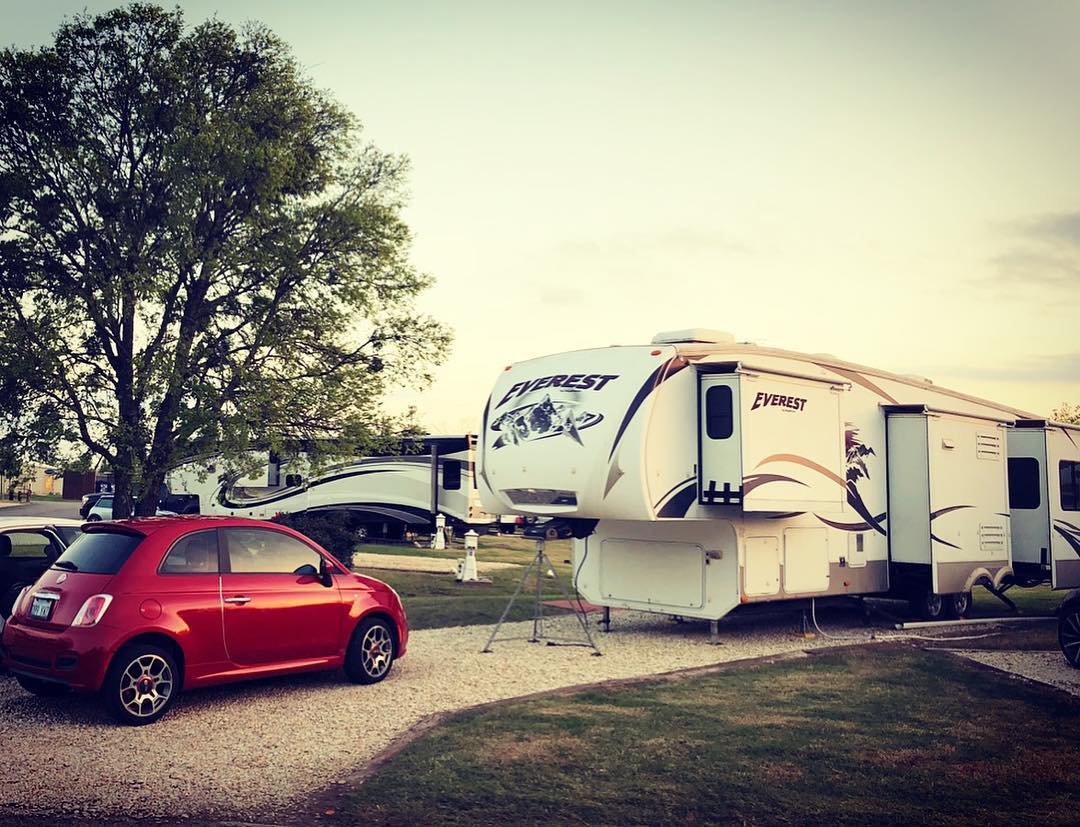

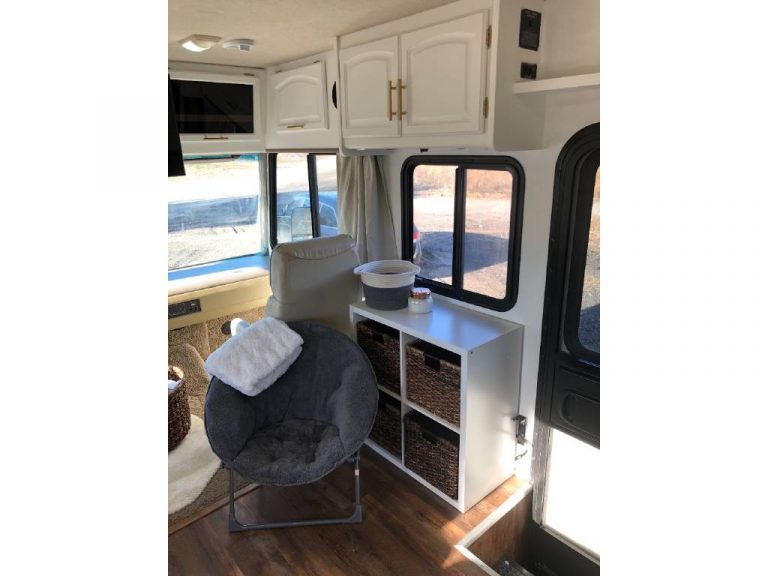
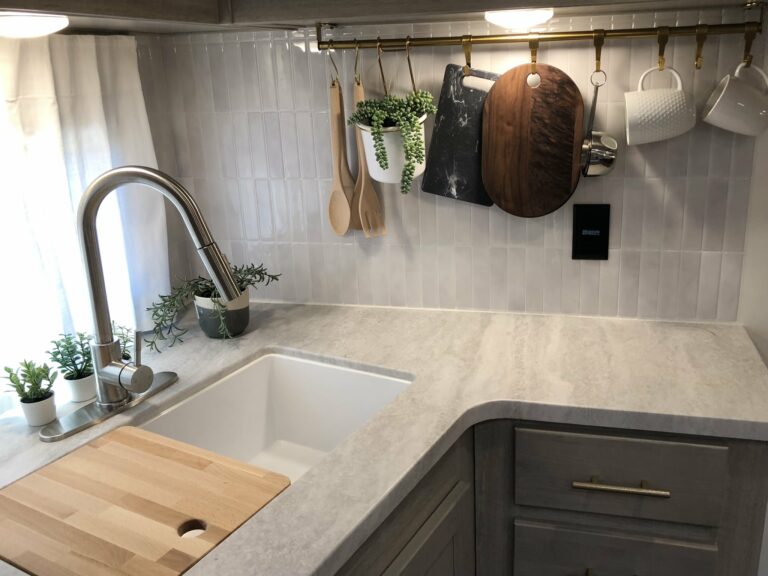

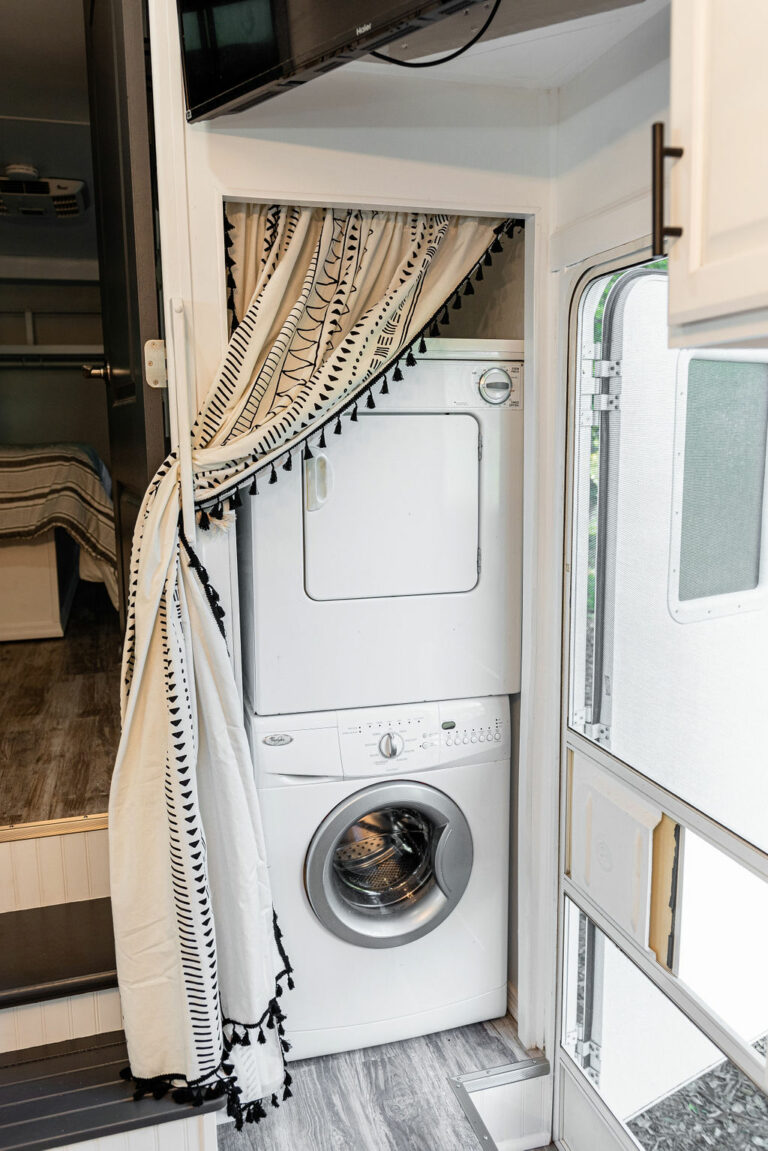
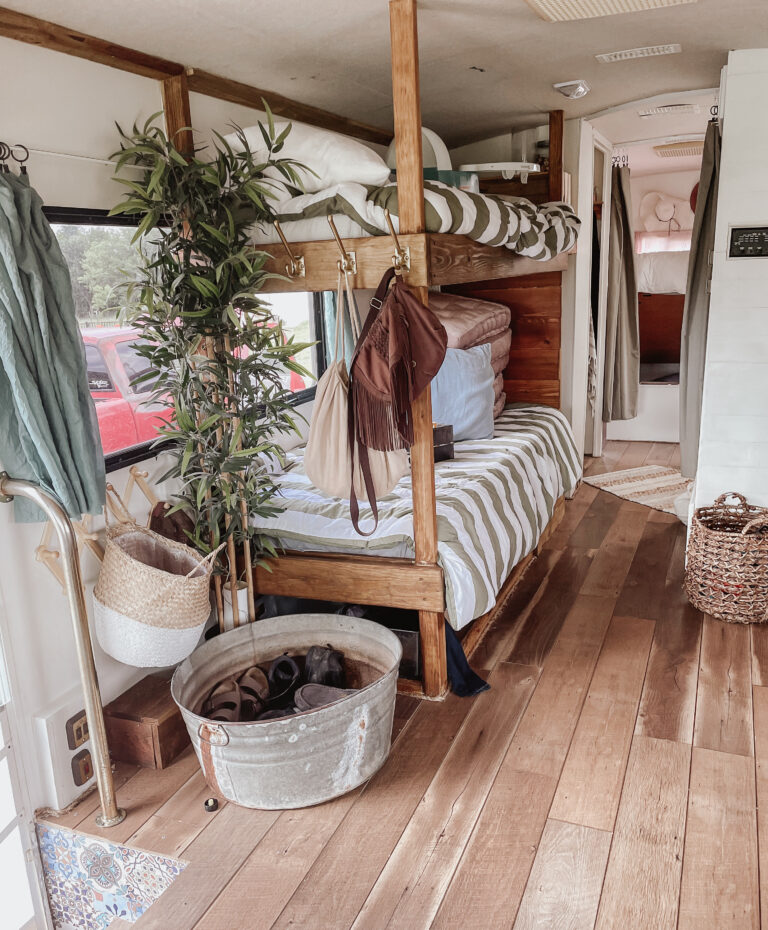
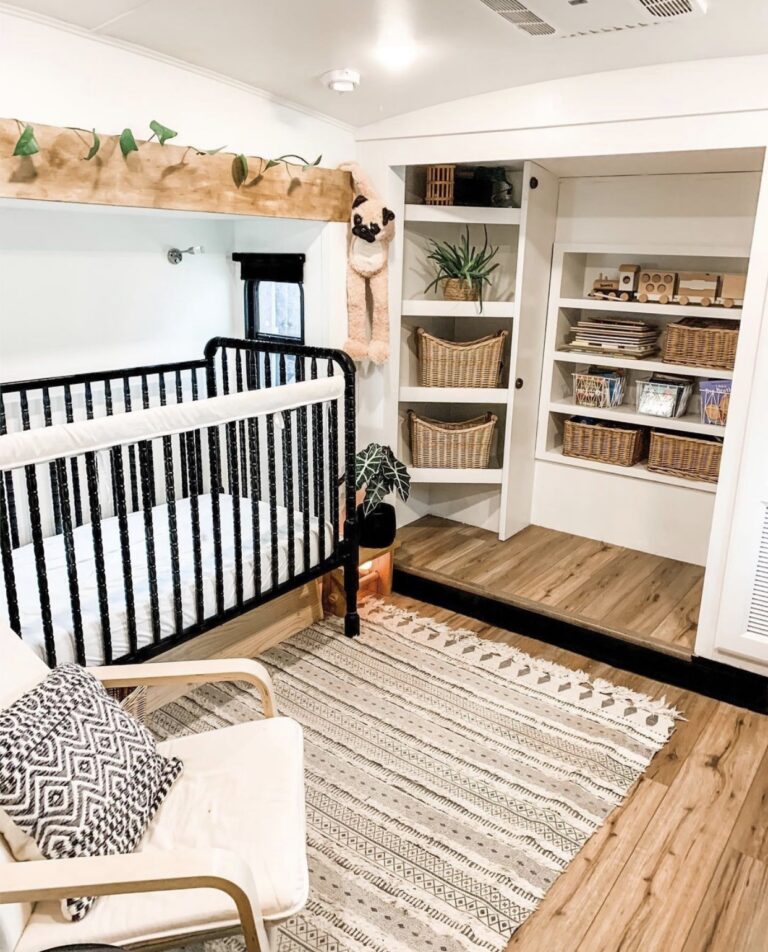
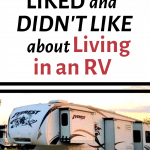

These are such great points, Ashley! While I can certainly relate to some of them, you’ve rightly pointed out that the experience will be different for everyone.
We’re in Australia (I mean, I know YOU know that! ;-)) and we live in a 14ft caravan with no bathroom. Costs us barely anything to live in (no debt, no rent since I do some work for the park in exchange) but it is teeny tiny and that’s the part that is probably the worst for me. I would like more room, but I’m happy to live this way because we’re seeking that very same thing as you. Freedom.
Freedom from having to work in one place for the next 30 years. Living in our caravan is a lot cheaper than in a house, which means my husband can work at a regular job, while I work on our online income. Hopefully our online income will soon cover our living expenses so we can hit the road properly.
Anyway, I loved this post, it really resonated with me!
Michelle 🙂
Ashley,
Thanks for this… it will surely help others that are thinking of jumping into the full time RV living. We did similar to you… sold our house.. bought a huge 5iver, didn’t have a tow vehicle but that was planned… moved to another city to better our income… only to find that only one of us could get employment. It was terribly hard. We had owned a small travel trailer and loved the idea of FT RV… but is just didn’t work for us either. We are close to retirement age and planned on that being something for retirement…. but we found that the 5th wheel was a PIA to move… unlike a motorhome that you just pull the electric jacks up and drive it away. Soooo we moved back into a house… purchased a 34′ class C motorhome for our retirement travels.. and are happy as we can be. We have a permanent location to live most months of the year and when we want to take off for 3 months to see the USA its a very easy and doable thing. Your post will most likely help others that have not fully vetted or thought through the process as in our case. THANKS!
I think we needed the experience in order to really know what we wanted! But I agree it would have been nice to have all the information BEFORE making such a huge financial investment.
Learn from your stoopid mistakes. Broke people should NEVER even consider full timing. And what type of idiot buys a large fifth wheel and has no truck!?
If you and that slug husband of yours are into the martial arts then I’m the second reincarnation of Bruce Lee.
Hi Rob, I shared your comment with some of our friends. Thanks for the laughs.
Yes Ma’am… totally understand.. ours was a costly mistake as well. But that’s what makes lives… experience…. both good and bad. Like I said, maybe your post will help others that have not thought it all through and help save them frustration and resources. BTW I may send you some DIY upgrades and modifications we have done to our class C. They have been posted to FB but since you are doing that they might be handy for others as well. Thanks again!!! Have a Wonderful, safe Christmas!
We lived in our 38 ft 5th wheel, and pulled it with a Ford F-350 Diesel for 4 years. It all started with the contract job my husband landed that paid very well. However, after a couple of years that job went away. So like so many others, we had been in Indiana in the winter….twice! With the most convenient parking location 30 miles from work. With a 500.00 plus campsite payment that didn’t include propane. Other places we went like Fredrick, Maryland was closer to work, but cost 1000.00 per mo. We were paying 2,300.00 per mo for parking space, truck payment, and RV payment. When you think about that… you can own a very nice home for less 🤦♀️
We have a height end RV but it doesn’t matter how much you pay it’s going to have problems!!! And we did! I’m in a house now and happy to have more space.
Big problem now is that we are upside down big time :((. So, trying to figure out what to do about this at the moment. I think it will be a big monkey on our backs for years to come., or take the big hit to our savings and eat the loss.
Good luck out there! Be smart, buy a used RV.
It depreciates way too fast.
I can definitely relate as I’m feeling the same way right now – we currently have our RV listed for less than its NADA guide and far less than we owe, and so far no inquiries. So at this point I’m figuring I’ll just have to pay it off like it or not! And that was with an RV we bought used. We were afraid to buy anything too old as first time RV owners, but I will definitely save up cash for our next RV!
I’ve lived in my 34ft Four Winds ‘Hurricane’ class ‘A’ motor home since 2014. For the most part it has been doable and enjoyable. I have to say “it’s not for everyone” and I’ve experienced ups and downs like extreme temps and repairs to systems onboard. Do it as long as it is good for you. Everyone is nott a vacationer or traveler. “Different strokes for different folks” I’m glad I experienced this lifestyle.
I agree!
All helpful information, I guess I just am surprised by your mortgage being 300 a month. Did you like in the 1950s? Where is this? Average rent for 1 bedroom where I live is 1500 a month and average house is 500,000 so…. I feel like anything is cheaper.
Ha, nope not in the 1950’s! 🙂 We bought our house in 2013 for $35k. It was a foreclosure, 3 bed, 2 bath, built in 1980, and we put about $15k into repairs, then sold it in 2016 for $69k. In 2018, it sold again for $85k, and now its off-market price is estimated at $105k, to give you an idea of how much the housing market has inflated. This was in Springfield, MO, and housing is far cheaper here than in some parts of the country. We’re currently back in Springfield renting a beautiful 3 bed, 2 bath home in one of the best neighborhoods in town for $1065/month, which is less than we paid monthly for our RV loan payment + insurance + lot rent.